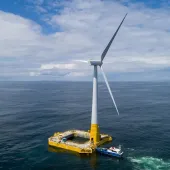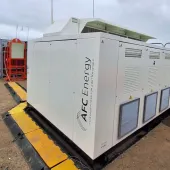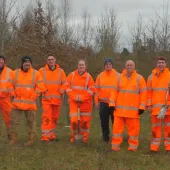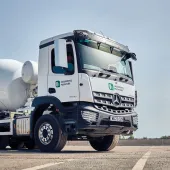Heidelberg Materials partner with Volvo to reduce emissions
Collaboration agreement to investigate use of electric vehicles for loading and hauling in Northern Europe
HEIDELBERG Materials have signed a collaboration agreement with Volvo Group with the potential to significantly reduce carbon emissions in the construction industry.
The aim is to jointly investigate and develop how the loading and hauling needs of Heidelberg Materials can be solved with the help of electrified vehicles and related services.
As part of the agreement, Volvo Group’s emission-free solutions – a mix of their electric trucks, construction equipment, machines, and productivity services – will be put to work in several of Heidelberg Materials’ Northern European sites and quarries, starting this year.
One example of the equipment that will be employed by Heidelberg Materials is Volvo Construction Equipment’s recently introduced 20-tonne wheel loader, the L120H Conversion, which delivers zero exhaust emissions and near-silent performance.
In the Northern Europe region, land-based transport accounts for a total of 6% of the value chain carbon footprint. Electrification of the Northern European fleet has the potential to reduce annual CO2 emissions by up to 200,000 tonnes. In addition, electrified vehicles provide a quieter and better work environment.
‘The partnership with Volvo is a lighthouse project in our industry and has the potential to significantly push the decarbonization of our entire value chain in Northern Europe,’ said Heidelberg Materials’ chief executive officer Dr Dominik von Achten.
‘We look forward to working together to identify and implement state-of-the-art solutions for a fast climate transition in the construction sector.’
Martin Lundstedt, chief executive officer and president of Volvo Group, said: ‘New collaborative partnerships like this address climate change across the value chain.
‘While we are focused on reducing carbon emissions for both our products and our own operations, we are also committed to helping our customers to lead by example, through innovative, well-orchestrated collaborations that deliver much-needed change.’
A six-month joint feasibility study will evaluate which emission-free vehicle technology and charging infrastructure will best suit the requirements of Heidelberg Materials’ operations regarding operating efficiency, maintenance and charging at the sites.
The holistic study will provide a unique opportunity to map, tailor and implement a complete CO2 reduction programme throughout the operations considering transport and loading activities.
The project will mainly focus on larger sites in the region, with the first vehicle already in operation this summer at Slite cement plant, in Sweden.










